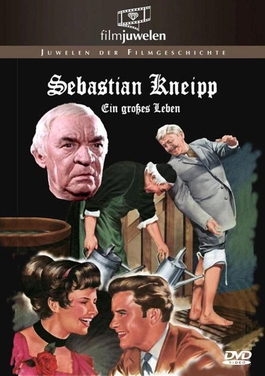
Sebastian Kneipp is a 1958 Austrian historical film directed by Wolfgang Liebeneiner and starring Carl Wery, Paul Hörbiger, and Gerlinde Locker. It is also sometimes known as Wasserdoktor. The film is a biopic of the Bavarian Sebastian Kneipp, one of the pioneers of naturopathic medicine.

The Captain is a 1971 West German comedy film directed by Kurt Hoffmann and starring Heinz Rühmann, Johanna Matz and Horst Tappert. The captain of an old tramp steamer is offered the chance to take over a luxury cruise ship.

Fireworks is a 1954 West German period musical comedy film directed by Kurt Hoffmann and starring Lilli Palmer, Karl Schönböck, and Romy Schneider. Palmer's rendition of the song "O mein Papa" became a major hit. It was Palmer's debut film in her native Germany, having spent many years in exile in Britain, and launched her career as a major star in the country.

Two Hearts Beat as One is a 1932 German musical film directed by Wilhelm Thiele and starring Lilian Harvey, Wolf Albach-Retty and Kurt Lilien. It was shot at the Babelsberg Studios in Berlin. The film's sets were designed by the art directors Werner Schlichting and Benno von Arent. A separate French-language version The Girl and the Boy was made, also starring Harvey.

The Congress Dances is a 1955 Austrian historical musical film directed by Franz Antel and starring Johanna Matz, Rudolf Prack and Hannelore Bollmann. It is a remake of the 1930 film The Congress Dances, about a romance that takes place during the Congress of Vienna in 1814.

The Glass Tower is a 1957 West German drama film directed by Harald Braun and starring Lilli Palmer, O.E. Hasse and Peter van Eyck. It was made by Bavaria Film at their studios in Munich. The film's sets were designed by the art director Walter Haag. Palmer plays the role of an adulterous socialite.
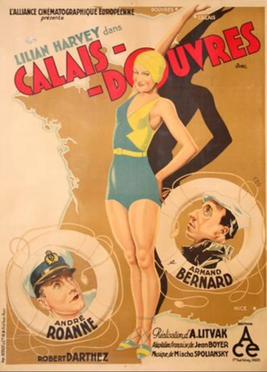
Calais-Dover is a 1931 French-German comedy film directed by Jean Boyer and Anatole Litvak and starring Lilian Harvey, André Roanne and Armand Bernard. It is the French-language version of the German film No More Love, with Harvey reprising her role. The title refers to the Dover–Calais ferry. It incorporated location shooting on the French Riviera with interiors shot at the Babelsberg Studios in Berlin. The film's sets were designed by the art directors Robert Herlth, Walter Röhrig and Werner Schlichting.

Ronny is a 1931 German musical comedy film directed by Reinhold Schünzel and starring Käthe von Nagy, Willy Fritsch, and Hans Wassmann. A separate French-language version Ronny was also released. It was shot at the Babelsberg Studios in Berlin and premiered at the city's Gloria-Palast. The film's art direction was by Werner Schlichting and Benno von Arent.
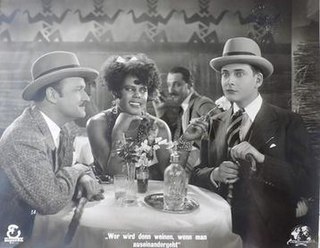
Why Cry at Parting? is a 1929 British-German silent film directed by Richard Eichberg and starring Dina Gralla, Harry Halm and Paul Morgan.
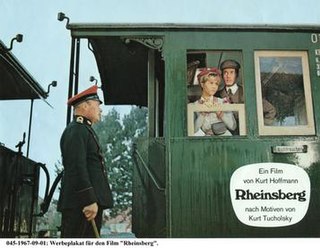
Rheinsberg is a 1967 West German romantic comedy film directed by Kurt Hoffmann and starring Cornelia Froboess, Christian Wolff and Werner Hinz. The film is based on a novel by Kurt Tucholsky set partly in Rheinsberg. Four years earlier Hoffmann had directed another Tucholsky adaptation Gripsholm Castle.
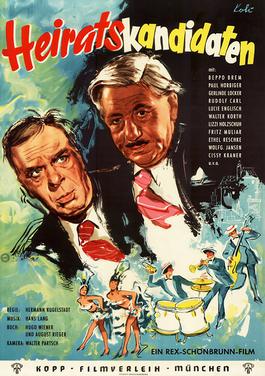
Candidates for Marriage is a 1958 Austrian-West German comedy film directed by Hermann Kugelstadt and starring Beppo Brem, Paul Hörbiger and Gerlinde Locker. It was shot at the Schönbrunn Studios in Vienna and on location around the city. The film's sets were designed by the art director Wolf Witzemann.

Hello Taxi is a 1958 Austrian comedy film directed by Hermann Kugelstadt and starring Hans Moser, Paul Hörbiger and Oskar Sima. Two old friends in Vienna, both carriage drivers, fall out when one of them buys a modern taxi.
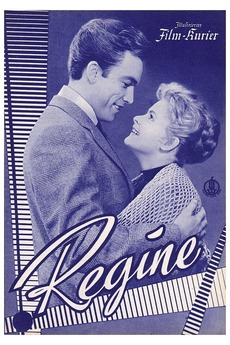
Regine is a 1956 West German drama film directed by Harald Braun and starring Johanna Matz, Erik Schumann and Horst Buchholz. It was shot at the Bavaria Studios in Munich. The film's sets were designed by the art directors Kurt Herlth and Robert Herlth.

Beloved Enemy is a 1955 West German historical drama film directed by Rolf Hansen and starring Ruth Leuwerik, Werner Hinz and Thomas Holtzmann. The film's plot was loosely inspired by the Fashoda Incident of 1898.
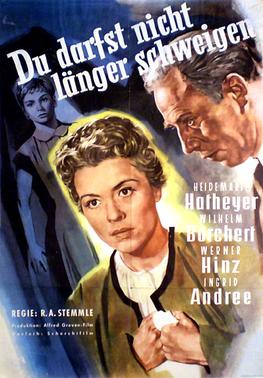
You Can No Longer Remain Silent is a 1955 West German romantic drama film directed by Robert A. Stemmle and starring Heidemarie Hatheyer, Wilhelm Borchert and Werner Hinz. It is based on the 1929 novel Morning of Life by Kristmann Gudmundsson. It is set amongst feuding Scandinavian fishing families.

Stage Fright or Lamp Fever is a 1960 West German drama film directed by Kurt Hoffmann and starring Dunja Movar, Bernhard Wicki and Antje Weisgerber.

My Daughter Patricia is a 1959 Austrian comedy film directed by Wolfgang Liebeneiner and starring Martin Held, Gerhard Riedmann and Gerlinde Locker.

Nina is a 1956 West German drama film directed by Rudolf Jugert and starring Anouk Aimée, Karlheinz Böhm and Peter Carsten.
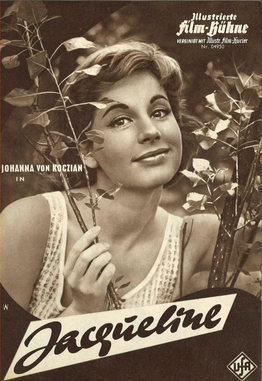
Jacqueline is a 1959 West German comedy film directed by Wolfgang Liebeneiner and starring Johanna von Koczian, Walther Reyer and Götz George. George won a German Film Award for best newcomer for his performance.

When Sweet Moonlight Is Sleeping in the Hills is a 1969 West German drama film directed by Wolfgang Liebeneiner and starring Werner Hinz, Luitgard Im and Diana Körner. It is based on the 1967 novel At the Height of the Moon by Eric Malpass. It is the sequel to the 1968 film Morning's at Seven.




















